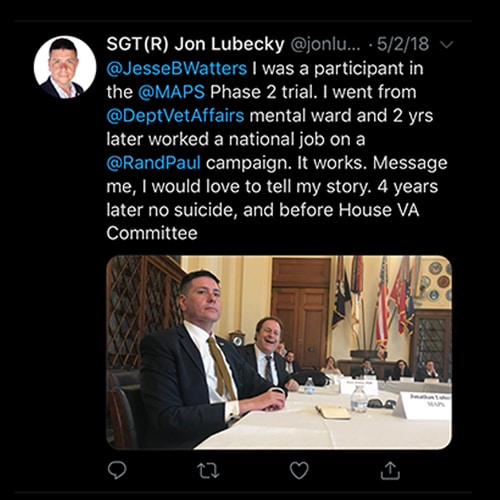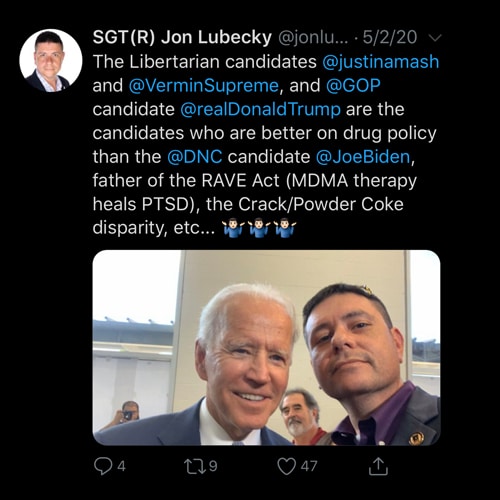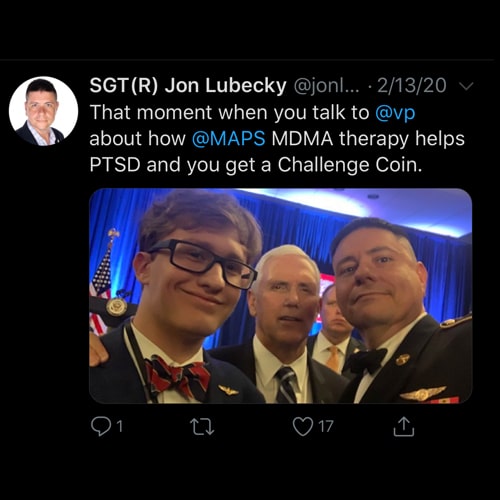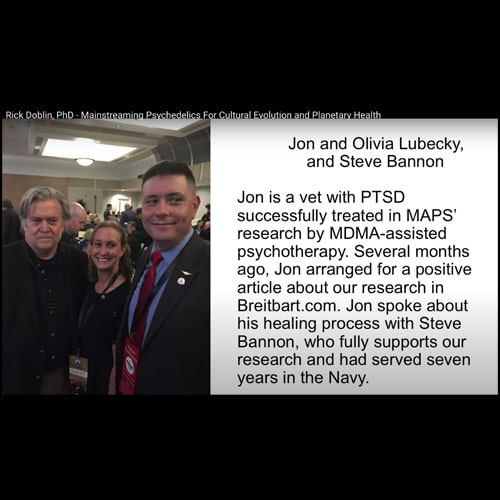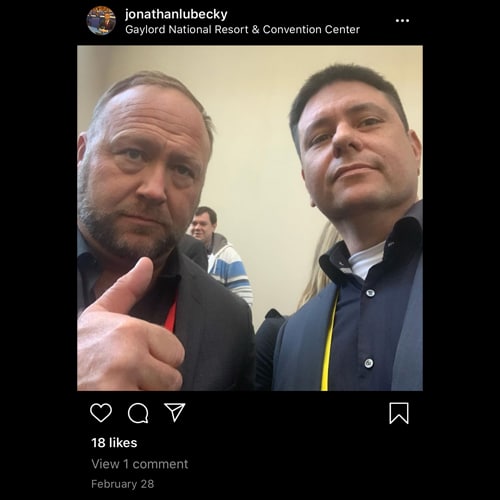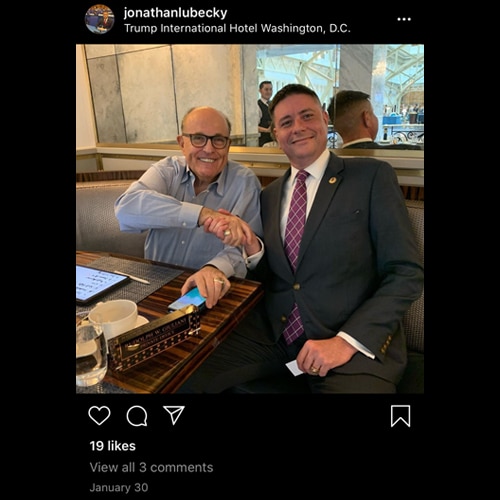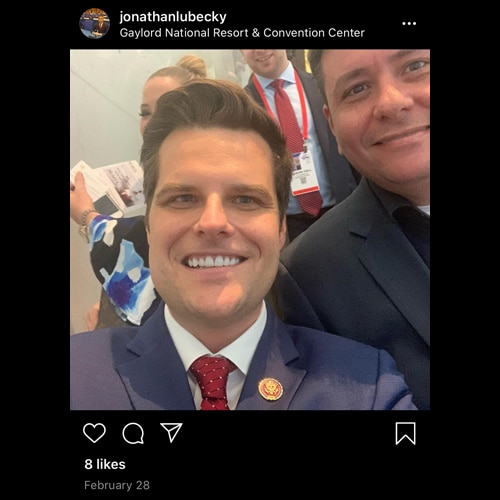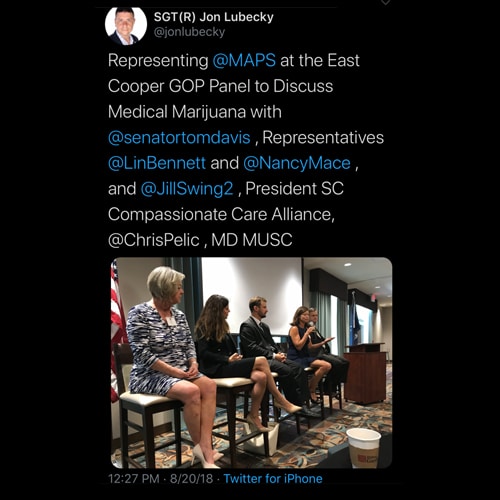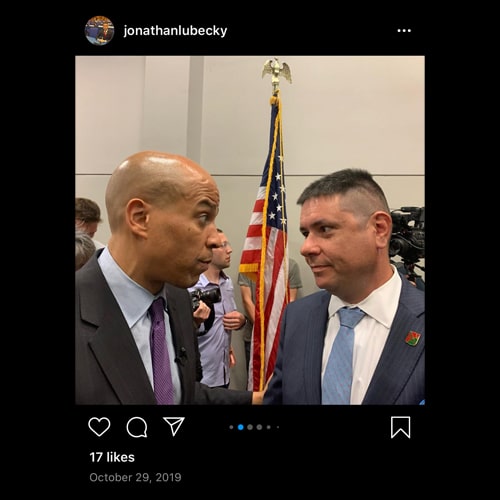
Since estabishing The Multidisciplinary Association for Psychedelic Studies (MAPS) in 1986, founder and executive director, Rick Doblin, has consistently articulated his goal to medicalize psychedelic compounds in the hopes of securing mainstream acceptance of psychedelic drugs, users, and cultures. Numerous people, including myself, have critiqued this approach as relying on the framework of dominant culture (and the longstanding ills of capitalism, white supremacism, patriarchy, and industrial civilization), thereby reproducing the destructive logic of these systems.
Doblin has consistently downplayed and dismissed these critiques. Additionally, under Doblin’s decades-long leadership, MAPS has failed to engage with assertions that its approach is little more than “respectability politics” meant to demonstrate that values within the “psychedelic community” are not at odds, but are in fact continuous with those of dominant culture. This approach endangers those of us who are commonly marginalized, brutalized, and murdered within dominant culture—and alienates us within psychedelic spaces that we may have sought out in pursuit of alternative cultural havens.
Over its 34 years of existence, MAPS has failed to provide meaningful historical evidence or coherent theoretical arguments for its strategy, relying instead on faith-based appeals to the “power” of psychedelics to “heal” society. In pursuit of medicalization and mainstreaming, Doblin has repeatedly argued that MAPS’ reputation and the legitimization of its research are more important than concerns about the sociopolitical implications of its research. For example, consider Doblin’s ongoing insistence on the importance of providing MDMA therapy to police and soldiers. Or notably, his defense of John Halpern, a former MAPS research collaborator at Harvard Medical School and DEA informant against William Leonard Pickard and Clyde Apperson.
Irrespective of its justifications, MAPS has repeatedly courted the forces of authoritarianism and white supremacism as a political strategy in pursuit of mainstreaming psychedelics. This is true regardless of the personally held beliefs of MAPS employees; some of whom I’ve seen challenge Doblin, only to find themselves shouted down in front of other staff.
More recently, under the guise of generating “bipartisan support” (read: courting reactionaries) for MDMA-assisted psychotherapy for veterans, MAPS has promoted the positive coverage it received from the far-right site Breitbart, and has attempted to influence (mostly) far-right Republicans through its self-identified “conservative whisperer,” Veterans & Governmental Affairs Liaison, Jonathan Lubecky. It’s worth noting that Lubecky is absent from MAPS’ staff page.
Lubecky, a retired US Army sergeant who participated in a MAPS-sponsored MDMA trial, can be seen on his personal social media accounts posing with politicians and operatives across the political spectrum, including Donald Trump, Mike Pence, Steve Bannon, Rudy Giuliani, Joe Biden, Alex Jones, Matt Gaetz (R-FL), Cory Booker (D-NJ), Rand Paul (R-KY), Chuck Grassley (R-IA), and former Wisconsin governor Scott Walker.
Lubecky’s forays into reactionary territory aren’t the only evidence of MAPS’ myopic focus on its own political agenda. Similarly telling is the organization’s willingness to accept funding from all-things-conservative financier Rebekah Mercer and ATAI Life Sciences’ founder Christian Angermayer, and its unwillingness to speak out against Peter Thiel, the chairman of Palantir and recent investor in defense-contractor startup Anduril.
Thiel has quickly become one of the largest investors in the emerging psychedelics industry. Thiel Capital Managing Director & Chief Medical Officer, Jason Camm, recently joined the board of ATAI Life Sciences. ATAI is the largest minority shareholder of COMPASS Pathways, founded by husband and wife team George Goldsmith and Katya Malievskaia. According to public documents, Goldsmith and Malievskaia have donated at least $455,000 to MAPS since 2013, including a recent donation of $300,000. Angermayer has donated at least $250,000 and Mercer has pledged $1,000,000.
When directly questioned on the subject, Doblin has demonstrated an unwillingness to acknowledge the war on Black, Brown, and poor people facilitated by psychedelic funders and investors like Mercer and Thiel. In one interview, Doblin said, “I’ve seen articles claiming ‘Peter Thiel controls the flow of psilocybin’…‘He’s this evil guy doing all these things with Trump!’ It’s guilt by association, which is not fair” (hyperlink added). While it doesn’t appear that anyone aside from Doblin has suggested that “Thiel controls the flow of psilocybin,” there is undeniable evidence that “Thiel does Trump’s dirty work.”
In light of these facts, it seems particularly absurd that on June 3, 2020, as a result of the national uprisings in response to the murder of George Floyd, Breonna Taylor, and countless others at the hands of police, MAPS published a press release entitled, “Statement of Solidarity: MAPS Stands Against Systemic Racism and for Justice and Healing.” The statement concludes by stating that, “MAPS and MAPS PBC [Public Benefit Corporation] are working every day to integrate a deeper anti-racist practice into our work. We have made slow, deliberate progress, and acknowledge that we have a long way to go. We commit to doing the work for collective liberation.” But MAPS’ work doesn’t evidence anti-racist principles; its main political strategy is based on demonstrating affinity for and utility to institutions and individuals who have repeatedly upheld violent white supremacism.
As long as its strategy relies on supporting the police and the military (institutions that exist to perpetuate white supremacism, class warfare, and imperialism) it’s not tenable for MAPS and its PBC to claim that they’re invested in “working every day to integrate a deeper anti-racist practice into [their] work.” Nor is it reasonable for them to assert that they’re committed to “doing the work for collective liberation,” as long as they’re accepting money from fascist oligarchs.
Below are some of the stances Doblin has taken over the years, indicating the degree to which MAPS has worked to support the institution of policing. In the following examples, it’s worth noting his focus on healing police, rather than the broader populace and victims of policing:
- In 2006, Doblin said, “I starting [sic] thinking about how traumatic it would be for a police officer to see the murdered body of a pregnant woman. I experienced some compassion for the police.” As a result, “MAPS and Morley proceeded to develop a Memorandum of Understanding for a potential study of MDMA-assisted psychotherapy for PTSD in Canadian RCMP officers.”
- In 2013, Alternet reported, “Doblin says MAPS would like to enroll the first police officer who has PTSD caused by work, in order to solidify the point that MDMA therapy can potentially benefit anyone.”
- In 2015, Doblin wrote, “Thirty years ago, it was law enforcement—police and the DEA—who led the charge to criminalize MDMA. Thirty years later, we have actually enrolled and treated a police officer with service-related PTSD in our South Carolina Phase 2 studies, as well as three firefighters (including one who was at the World Trade Center on 9/11) and 20 U.S. military veterans.”
- In 2016, Doblin said, “So, we’ve in our study we just finished with veterans, for political reasons what I wanted to do was to say, It’s for veterans, firefighters and police officers…I didn’t think we’d ever get any firefighters or police officers, but we did…Building those bridges to the police is just incredible.”
- In 2018, Doblin gave a talk at the International Association of Chiefs of Police (IACP) Police Physicians Section Conference titled, “Recovering Cops from Severe PTSD: FDA Approved Psychedelic Treatment and Therapy.”
- In 2019, while discussing his “treatment” of a retired cop at Burning Man, Doblin said, “And the fact that it was both a veteran and a retired police officer, the same person…it just made me think that this is the ideal kind of person we’re trying to show. If we’re trying to mainstream psychedelics, you know, what’s more mainstream than a veteran and a police officer?”
These examples evidence 14 years of MAPS and Doblin advocating MDMA-assisted therapies for the state-sanctioned white supremacist enforcers of capitalism who murder Black, Brown, Indigenous, and poor people with impunity. It’s worth noting that the police whom MAPS has been so eager to treat are the shock troops on the front lines of the war on [some people who use certain] drugs. This “war” has wrought the harms of incarceration, legal battles, surveillance, and death on members of communities MAPS claims to support, a point Doblin appears to chronically ignore or downplay in his rush to celebrate psychedelic treatments for law enforcement.
MAPS’ attempts to diversify psychedelic research have historically fallen short. A study intended to advance racially-diverse MDMA research at the University of Connecticut, headed by Dr. Monnica Williams, was terminated for a variety of reasons in 2018. A 2018 literature review—authored in-part by Dr. Williams—concluded, “The White washing of psychedelic drug use has unfortunately spread to medical research, as we find extremely low rates of participation by people of color in psychedelic-assisted psychotherapy studies and a lack of generalizability of these studies to critical clinical issues for people of color.” Perhaps Doblin’s public fawning over police offers some additional insight as to why his organization has struggled to productively engage with issues of race and class for decades.
It should be noted that Doblin is fully aware of the critiques of his approach. Doblin and his staff have attended a number of talks I’ve presented that have critically analyzed their fixation on police and soldiers, and I have had multiple conversations with them on the topic. The reality is that they made the political choice of siding with police and soldiers, rather than the communities these forces occupy and brutalize on a daily basis. If MAPS truly wants to “integrate anti-racist practices” in order to “work for collective liberation,” it seems necessary for it to acknowledge and disavow the strategy it’s taken to-date.
It is incongruous for MAPS to publish a public relations statement in which it “commit[s] to doing the work for collective liberation” when Doblin has explicitly identified police as the “ideal kind of person” and called them “more mainstream” than the people they surveil, assault, and murder. Perhaps what MAPS actually means by “collective liberation” is “psychedelic research and therapy.” This would seem to present an updated “dose the water” theory of change, where therapists’ offices substitute for municipal water supplies. To date, no one has articulated a coherent explanation of how this would achieve “collective liberation.” However, this interpretation would explain at least some of the rationale for Doblin’s sheltering of John Halpern; a decision which provides additional evidence of MAPS’ affinity for police and their collaborators, rather than the communities they terrorize.
For those unfamiliar with the tale of Halpern, I would recommend reading Jon Hanna’s Halperngate, Erik Davis’ The Bad Shaman Meets the Wayward Doc, and checking out the related Erowid vault. In brief, Halpern was an informant in the case of United States of America vs. William Leonard Pickard and Clyde Apperson, ultimately leading to Apperson receiving a thirty-year prison term and Pickard getting two life sentences for manufacturing and distributing LSD. In the context of examining MAPS’ prioritization of its research over “collective liberation,” perhaps the most relevant comment Doblin made in defense of Halpern is:
“After John’s cooperation with DEA began, I saw that he was motivated even more than before to work to end the suppression of scientific research with psychedelics, despite such research potentially being met with disapproval by DEA. John is a highly trained physician/researcher with a healthy measure of courage. I saw that he was committed to proceeding with integrity and an unwavering allegiance to the scientific method…Also, John was uniquely positioned at Harvard to make progress that nobody else was willing to even attempt…In retrospect, I continue to believe this decision to work together was correct, as evidenced by John’s expanding research.”
Doblin has repeatedly placed the sanctity of MAPS’ psychedelic research agenda above all else.
Even if we completely ignore MAPS’ long-standing eagerness to aid and abet cops and snitches, there’s still overwhelming evidence as to its support of white supremacist systems of domination at home and abroad. For years, Doblin has proudly discussed assisting the US military and the veterans of its numerous imperial conquests. Additionally, he and his organization have repeatedly courted objectionable donors, whose contributions they display as political trophies, completely ignoring (and at times incoherently ridiculing) the objections of those who point to the body counts and systemic violence of psychedelic funders such as Peter Thiel, Rebekah Mercer, and Christian Angermayer.
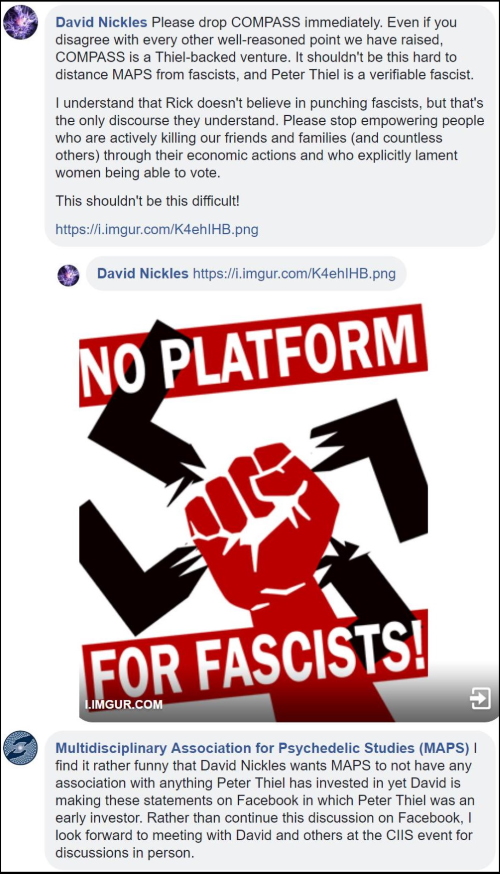
MAPS has sung the praises of military veterans so frequently that its focus on healing the perpetrators of large-scale international violence (rather than their millions of victims) should be common knowledge. What may come as a surprise is the fact that, in 2013, the organization actually tried “to persuade military medical officials to permit a clinical trial that would test MDMA…in active duty soldiers.” In 2013, US forces were deployed in 134 countries around the globe, maintaining US hegemony and the death, destruction, and exploitation such dominance requires. No reframing of history can spin aiding and abetting the US military, with its litany of war crimes, as “doing the work for collective liberation.” Yet the recent press release from MAPS suggests that readers should overlook these realities and instead buy into a mythical narrative of how the organization sees itself and the world.
The fixation on soldiers within the project of psychedelic medicalization largely hinges on the narratives associated with treating individuals mythologized as the protectors of American freedom and liberty. This strategy, in turn, creates opportunities to make inroads with conservatives, resulting in certain political and financial dividends. While Doblin has made a show of publicly questioning the likelihood that soldiers who have experienced psychedelic-assisted therapies will continue to wage war, he has also stated that he doesn’t actually believe MDMA will lead to soldiers leaving the military. Additionally, he has suggested that MDMA might make “better soldiers” and acknowledged secret military research into the use of MDMA. Doblin’s self-contradictions on the topic of treating soldiers highlight the bad math of his political calculations to “support the troops” in hopes of securing backing from the reactionary right. These calculations present direct threats to millions abroad as well as those of us who face the boomerang effects of US imperialism coming home to roost.
MAPS’ approach ignores the economic incentives for cost-saving psychedelic “maintenance therapies” in militarized contexts and the structural nature of military enlistment in the US. It’s expensive to train soldiers, especially those in high-skilled/high-stress positions like drone operators. If MDMA can be used to alleviate PTSD in active-duty soldiers, it not only prevents the military from hemorrhaging money on training while increasing combat readiness, it also offers convenient public relations narratives. The military can claim to have a cure on hand for its soldiers’ traumas, even as they cause untold trauma and death abroad—a line of thinking MAPS already seems quite comfortable with, based on its own statements and actions.
While pursuing approaches that bolster US imperialist narratives, MAPS has failed to present a coherent picture of how MDMA therapy for veterans (or active duty troops) inhibits the systemic drivers of military enlistment (likely because it doesn’t). In the US, “service members typically earn more than civilians with a comparable level of education. Moreover, they receive many other benefits that civilians often do not, including housing allowances, subsidized child care, tuition assistance, and top-of-the-line comprehensive health care.” Doblin has eagerly sought out collaboration with and funding from people who advocate the shredding of social safety nets, inevitably worsening those systemic drivers by attacking government funding for policies that could subsidize healthcare, food, shelter, and education. And psychedelic financiers like Thiel, Mercer, and Angermayer aren’t just invested in advancing dynamics that increase societal inequality and militarism, they’re actively engaged in bolstering policing and other projects of white supremacism and plutocratic class war.
As Psymposia previously stated in Dear Psychedelic Researchers, “Thiel’s list of antisocial and racist behaviors is too long to detail here (1, 2, 3, 4, 5, 6, 7, 8, 9…), [but] using surveillance technology to round up and deport Brown people, and supporting apartheid should cause alarm.” The fact of the matter is that Thiel’s endeavors have repeatedly reinforced the white supremacist status quo. Thiel’s technology has been deployed against drug users, and it’s hard to miss the connections between Doblin’s disregard for communal safety in defense of Halpern and his lack of concern about Thiel’s professional anti-drug endeavors.
I have personally raised objections about Thiel’s, Mercer’s, and Angermayer’s creation, funding, and support of repressive projects to Doblin and his staff—none of whom have engaged with my concerns in a serious manner. When Psymposia questioned Doblin about Thiel in 2018, Doblin replied, “What I wish were different were not that Peter Thiel have not invested in COMPASS, but I wish he would have donated to MAPS…Republicans need [psychedelics] more than anyone else.” Doblin’s unwillingness to engage seriously with these issues is disturbing.
All of this is to say that I don’t know what MAPS means when it states, “We commit to doing the work for collective liberation,” because the organization’s strategy, to date, has relied on the logic of what bell hooks calls “imperialist white supremacist capitalist patriarchy” and all of the authoritarian and reactionary components therein. Nor do I know what the organization means when it claims that “MAPS and MAPS PBC stand in solidarity with people collectively raising their voices to assert that Black lives matter,” because its decades-long canonization of the police and military—institutions charged with upholding American capitalism—is clearly and undeniably at odds with that assertion.
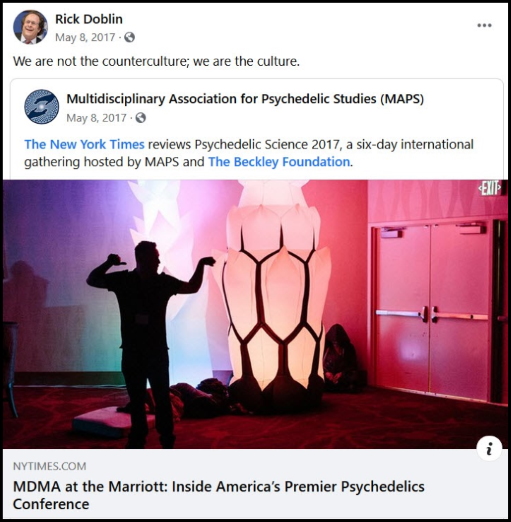
No one would take a similar statement about “collective liberation” seriously if it came from any other pharmaceutical company. Some will protest that MAPS is different, because of its focus on PTSD and its attempts to mainstream psychedelics. Nevertheless, such critics must reconcile the simple reality that organizations cannot meaningfully fight trauma while providing material aid to those causing trauma on a global scale.
In reality, MAPS is not a liberatory organization; its psychedelic-political strategy is fundamentally antagonistic to liberatory struggle. MAPS has consistently promoted the police—purveyors of professionalized authoritarian violence—as the “ideal” vehicle for its project of mainstreaming psychedelics. Since May 26, rebels in all 50 states and countries around the world have demonstrated what liberatory struggle can look like. MAPS would do well to acknowledge the reality that its current strategy is predicated on complicity with policing at home and abroad, and ask itself if it’s really prepared to cut ties with all individuals and institutions that reinforce policing and white supremacism. Because, if MAPS really wants to commit to anti-racist and liberatory struggles, it must divest from its current strategy and stop supporting white supremacism.
Some Resources:
Bail Funds/Legal Help by City (live document)
Abolition
- Are Prisons Obsolete?
- Ruth Wilson Gilmore Makes the Case for Abolition
- Angela Davis on Abolition, Calls to Defund Police, Toppled Racist Statues & Voting in 2020 Election
- Justice in America Episode 20: Mariame Kaba and Prison Abolition
- Ruth Wilson Gilmore & Naomi Murakawa on Covid-19, Decarceration, and Abolition
Ally Politics
- Another Word for White Ally is Coward
- Ain’t No PC Gonna Fix it Baby: A Critique of Ally Politics
- With Allies Like These: Reflections on Privilege Reductionism
- Accomplices Not Allies: Abolishing the Ally Industrial Complex
Harm Reduction for Folks In The Streets:
- Riot Medicine: A free manual for practicing insurrectionary medicine
- Anti-Doxing Guide for Activists Facing Attacks
- Digital Security
- Protocols for Common Injuries from Police Weapons For Street Medics and Medical Professionals Treating Demonstrators
- Surveillance Self-Defense Toolkit (101 article by Wired)
- Safety guidelines for protesting in a pandemic
Policing
- What Will It Take to Stop the Police from Killing?
- This Is Anarchy: Eight Ways the Black Lives Matter and Justice for George Floyd Uprisings Reflect Anarchist Ideas in Action
- The Siege of the Third Precinct in Minneapolis: An Account and Analysis
- Minneapolis: Now This Fight Has Two Sides What the Riots Mean for the COVID-19 Era
- Minneapolis Uprising, Part 1—How to Abolish the Police
- The Failure of Nonviolence
- Learning from Ferguson
- Slave Patrols and Civil Servants A History of Policing in Two Modes
- Our Enemies in Blue: Police and Power in America
- What They Mean when They Say Peace
- The Thin Blue Line Is a Burning Fuse: Why Every Struggle Is Now a Struggle against the Police
Correction: In a previous version of this story we reported that George Goldsmith and Katya Malievskaia have donated at least $475,000 to MAPS since 2013. According to public documents the correct amount is at least $455,000. The story has been updated accordingly.
Hey! Before you go… Psymposia is a 501(c)(3) non-profit media organization that offers critical perspectives on drugs, politics, and culture. We strive to ask challenging questions, and we’re committed to independent reporting, critical analysis, and holding those who wield power accountable.
Our perspectives are informed by critical analysis of the systemic crises of capitalism that have directly contributed to the unmitigated growth of addiction, depression, suicide, and the unraveling of our social relations. The same economic elite and powerful corporate interests who have profited from causing these problems are now proposing “solutions”—solutions which both line their pockets and mask the necessity of structural change.
In order for us to keep unpacking these issues and informing our audience, we need your continuing support. You can sustain Psymposia by becoming a supporter for as little as $2 a month.
David Nickles
David Nickles is an underground researcher and harm reduction advocate. He has presented social critiques and commentary on psychedelic culture and radical politics, as well as novel phytochemical data from the DMT-Nexus, at venues around the world. David’s work focuses on the social and cultural implications of psychoactive substances, utilizing critical theory and structural analysis to examine the intersections of drugs and society. He is a vocal opponent of the mainstreaming and commodification of psychedelic compounds and rituals, believing that such approaches inherently obscure the liberatory potential of psychedelic experiences.
Since estabishing The Multidisciplinary Association for Psychedelic Studies (MAPS) in 1986, founder and executive director, Rick Doblin, has consistently articulated his goal to medicalize psychedelic compounds in the hopes of securing mainstream acceptance of psychedelic drugs, users, and cultures. Numerous people, including myself, have critiqued this approach as relying on the framework of dominant culture (and the longstanding ills of capitalism, white supremacism, patriarchy, and industrial civilization), thereby reproducing the destructive logic of these systems.
Doblin has consistently downplayed and dismissed these critiques. Additionally, under Doblin’s decades-long leadership, MAPS has failed to engage with assertions that its approach is little more than “respectability politics” meant to demonstrate that values within the “psychedelic community” are not at odds, but are in fact continuous with those of dominant culture. This approach endangers those of us who are commonly marginalized, brutalized, and murdered within dominant culture—and alienates us within psychedelic spaces that we may have sought out in pursuit of alternative cultural havens.
Over its 34 years of existence, MAPS has failed to provide meaningful historical evidence or coherent theoretical arguments for its strategy, relying instead on faith-based appeals to the “power” of psychedelics to “heal” society. In pursuit of medicalization and mainstreaming, Doblin has repeatedly argued that MAPS’ reputation and the legitimization of its research are more important than concerns about the sociopolitical implications of its research. For example, consider Doblin’s ongoing insistence on the importance of providing MDMA therapy to police and soldiers. Or notably, his defense of John Halpern, a former MAPS research collaborator at Harvard Medical School and DEA informant against William Leonard Pickard and Clyde Apperson.
Irrespective of its justifications, MAPS has repeatedly courted the forces of authoritarianism and white supremacism as a political strategy in pursuit of mainstreaming psychedelics. This is true regardless of the personally held beliefs of MAPS employees; some of whom I’ve seen challenge Doblin, only to find themselves shouted down in front of other staff.
More recently, under the guise of generating “bipartisan support” (read: courting reactionaries) for MDMA-assisted psychotherapy for veterans, MAPS has promoted the positive coverage it received from the far-right site Breitbart, and has attempted to influence (mostly) far-right Republicans through its self-identified “conservative whisperer,” Veterans & Governmental Affairs Liaison, Jonathan Lubecky. It’s worth noting that Lubecky is absent from MAPS’ staff page.
Lubecky, a retired US Army sergeant who participated in a MAPS-sponsored MDMA trial, can be seen on his personal social media accounts posing with politicians and operatives across the political spectrum, including Donald Trump, Mike Pence, Steve Bannon, Rudy Giuliani, Joe Biden, Alex Jones, Matt Gaetz (R-FL), Cory Booker (D-NJ), Rand Paul (R-KY), Chuck Grassley (R-IA), and former Wisconsin governor Scott Walker.
Lubecky’s forays into reactionary territory aren’t the only evidence of MAPS’ myopic focus on its own political agenda. Similarly telling is the organization’s willingness to accept funding from all-things-conservative financier Rebekah Mercer and ATAI Life Sciences’ founder Christian Angermayer, and its unwillingness to speak out against Peter Thiel, the chairman of Palantir and recent investor in defense-contractor startup Anduril.
Thiel has quickly become one of the largest investors in the emerging psychedelics industry. Thiel Capital Managing Director & Chief Medical Officer, Jason Camm, recently joined the board of ATAI Life Sciences. ATAI is the largest minority shareholder of COMPASS Pathways, founded by husband and wife team George Goldsmith and Katya Malievskaia. According to public documents, Goldsmith and Malievskaia have donated at least $455,000 to MAPS since 2013, including a recent donation of $300,000. Angermayer has donated at least $250,000 and Mercer has pledged $1,000,000.
When directly questioned on the subject, Doblin has demonstrated an unwillingness to acknowledge the war on Black, Brown, and poor people facilitated by psychedelic funders and investors like Mercer and Thiel. In one interview, Doblin said, “I’ve seen articles claiming ‘Peter Thiel controls the flow of psilocybin’…‘He’s this evil guy doing all these things with Trump!’ It’s guilt by association, which is not fair” (hyperlink added). While it doesn’t appear that anyone aside from Doblin has suggested that “Thiel controls the flow of psilocybin,” there is undeniable evidence that “Thiel does Trump’s dirty work.”
In light of these facts, it seems particularly absurd that on June 3, 2020, as a result of the national uprisings in response to the murder of George Floyd, Breonna Taylor, and countless others at the hands of police, MAPS published a press release entitled, “Statement of Solidarity: MAPS Stands Against Systemic Racism and for Justice and Healing.” The statement concludes by stating that, “MAPS and MAPS PBC [Public Benefit Corporation] are working every day to integrate a deeper anti-racist practice into our work. We have made slow, deliberate progress, and acknowledge that we have a long way to go. We commit to doing the work for collective liberation.” But MAPS’ work doesn’t evidence anti-racist principles; its main political strategy is based on demonstrating affinity for and utility to institutions and individuals who have repeatedly upheld violent white supremacism.
As long as its strategy relies on supporting the police and the military (institutions that exist to perpetuate white supremacism, class warfare, and imperialism) it’s not tenable for MAPS and its PBC to claim that they’re invested in “working every day to integrate a deeper anti-racist practice into [their] work.” Nor is it reasonable for them to assert that they’re committed to “doing the work for collective liberation,” as long as they’re accepting money from fascist oligarchs.
Below are some of the stances Doblin has taken over the years, indicating the degree to which MAPS has worked to support the institution of policing. In the following examples, it’s worth noting his focus on healing police, rather than the broader populace and victims of policing:
- In 2006, Doblin said, “I starting [sic] thinking about how traumatic it would be for a police officer to see the murdered body of a pregnant woman. I experienced some compassion for the police.” As a result, “MAPS and Morley proceeded to develop a Memorandum of Understanding for a potential study of MDMA-assisted psychotherapy for PTSD in Canadian RCMP officers.”
- In 2013, Alternet reported, “Doblin says MAPS would like to enroll the first police officer who has PTSD caused by work, in order to solidify the point that MDMA therapy can potentially benefit anyone.”
- In 2015, Doblin wrote, “Thirty years ago, it was law enforcement—police and the DEA—who led the charge to criminalize MDMA. Thirty years later, we have actually enrolled and treated a police officer with service-related PTSD in our South Carolina Phase 2 studies, as well as three firefighters (including one who was at the World Trade Center on 9/11) and 20 U.S. military veterans.”
- In 2016, Doblin said, “So, we’ve in our study we just finished with veterans, for political reasons what I wanted to do was to say, It’s for veterans, firefighters and police officers…I didn’t think we’d ever get any firefighters or police officers, but we did…Building those bridges to the police is just incredible.”
- In 2018, Doblin gave a talk at the International Association of Chiefs of Police (IACP) Police Physicians Section Conference titled, “Recovering Cops from Severe PTSD: FDA Approved Psychedelic Treatment and Therapy.”
- In 2019, while discussing his “treatment” of a retired cop at Burning Man, Doblin said, “And the fact that it was both a veteran and a retired police officer, the same person…it just made me think that this is the ideal kind of person we’re trying to show. If we’re trying to mainstream psychedelics, you know, what’s more mainstream than a veteran and a police officer?”
These examples evidence 14 years of MAPS and Doblin advocating MDMA-assisted therapies for the state-sanctioned white supremacist enforcers of capitalism who murder Black, Brown, Indigenous, and poor people with impunity. It’s worth noting that the police whom MAPS has been so eager to treat are the shock troops on the front lines of the war on [some people who use certain] drugs. This “war” has wrought the harms of incarceration, legal battles, surveillance, and death on members of communities MAPS claims to support, a point Doblin appears to chronically ignore or downplay in his rush to celebrate psychedelic treatments for law enforcement.
MAPS’ attempts to diversify psychedelic research have historically fallen short. A study intended to advance racially-diverse MDMA research at the University of Connecticut, headed by Dr. Monnica Williams, was terminated for a variety of reasons in 2018. A 2018 literature review—authored in-part by Dr. Williams—concluded, “The White washing of psychedelic drug use has unfortunately spread to medical research, as we find extremely low rates of participation by people of color in psychedelic-assisted psychotherapy studies and a lack of generalizability of these studies to critical clinical issues for people of color.” Perhaps Doblin’s public fawning over police offers some additional insight as to why his organization has struggled to productively engage with issues of race and class for decades.
It should be noted that Doblin is fully aware of the critiques of his approach. Doblin and his staff have attended a number of talks I’ve presented that have critically analyzed their fixation on police and soldiers, and I have had multiple conversations with them on the topic. The reality is that they made the political choice of siding with police and soldiers, rather than the communities these forces occupy and brutalize on a daily basis. If MAPS truly wants to “integrate anti-racist practices” in order to “work for collective liberation,” it seems necessary for it to acknowledge and disavow the strategy it’s taken to-date.
It is incongruous for MAPS to publish a public relations statement in which it “commit[s] to doing the work for collective liberation” when Doblin has explicitly identified police as the “ideal kind of person” and called them “more mainstream” than the people they surveil, assault, and murder. Perhaps what MAPS actually means by “collective liberation” is “psychedelic research and therapy.” This would seem to present an updated “dose the water” theory of change, where therapists’ offices substitute for municipal water supplies. To date, no one has articulated a coherent explanation of how this would achieve “collective liberation.” However, this interpretation would explain at least some of the rationale for Doblin’s sheltering of John Halpern; a decision which provides additional evidence of MAPS’ affinity for police and their collaborators, rather than the communities they terrorize.
For those unfamiliar with the tale of Halpern, I would recommend reading Jon Hanna’s Halperngate, Erik Davis’ The Bad Shaman Meets the Wayward Doc, and checking out the related Erowid vault. In brief, Halpern was an informant in the case of United States of America vs. William Leonard Pickard and Clyde Apperson, ultimately leading to Apperson receiving a thirty-year prison term and Pickard getting two life sentences for manufacturing and distributing LSD. In the context of examining MAPS’ prioritization of its research over “collective liberation,” perhaps the most relevant comment Doblin made in defense of Halpern is:
“After John’s cooperation with DEA began, I saw that he was motivated even more than before to work to end the suppression of scientific research with psychedelics, despite such research potentially being met with disapproval by DEA. John is a highly trained physician/researcher with a healthy measure of courage. I saw that he was committed to proceeding with integrity and an unwavering allegiance to the scientific method…Also, John was uniquely positioned at Harvard to make progress that nobody else was willing to even attempt…In retrospect, I continue to believe this decision to work together was correct, as evidenced by John’s expanding research.”
Doblin has repeatedly placed the sanctity of MAPS’ psychedelic research agenda above all else.
Even if we completely ignore MAPS’ long-standing eagerness to aid and abet cops and snitches, there’s still overwhelming evidence as to its support of white supremacist systems of domination at home and abroad. For years, Doblin has proudly discussed assisting the US military and the veterans of its numerous imperial conquests. Additionally, he and his organization have repeatedly courted objectionable donors, whose contributions they display as political trophies, completely ignoring (and at times incoherently ridiculing) the objections of those who point to the body counts and systemic violence of psychedelic funders such as Peter Thiel, Rebekah Mercer, and Christian Angermayer.

MAPS has sung the praises of military veterans so frequently that its focus on healing the perpetrators of large-scale international violence (rather than their millions of victims) should be common knowledge. What may come as a surprise is the fact that, in 2013, the organization actually tried “to persuade military medical officials to permit a clinical trial that would test MDMA…in active duty soldiers.” In 2013, US forces were deployed in 134 countries around the globe, maintaining US hegemony and the death, destruction, and exploitation such dominance requires. No reframing of history can spin aiding and abetting the US military, with its litany of war crimes, as “doing the work for collective liberation.” Yet the recent press release from MAPS suggests that readers should overlook these realities and instead buy into a mythical narrative of how the organization sees itself and the world.
The fixation on soldiers within the project of psychedelic medicalization largely hinges on the narratives associated with treating individuals mythologized as the protectors of American freedom and liberty. This strategy, in turn, creates opportunities to make inroads with conservatives, resulting in certain political and financial dividends. While Doblin has made a show of publicly questioning the likelihood that soldiers who have experienced psychedelic-assisted therapies will continue to wage war, he has also stated that he doesn’t actually believe MDMA will lead to soldiers leaving the military. Additionally, he has suggested that MDMA might make “better soldiers” and acknowledged secret military research into the use of MDMA. Doblin’s self-contradictions on the topic of treating soldiers highlight the bad math of his political calculations to “support the troops” in hopes of securing backing from the reactionary right. These calculations present direct threats to millions abroad as well as those of us who face the boomerang effects of US imperialism coming home to roost.
MAPS’ approach ignores the economic incentives for cost-saving psychedelic “maintenance therapies” in militarized contexts and the structural nature of military enlistment in the US. It’s expensive to train soldiers, especially those in high-skilled/high-stress positions like drone operators. If MDMA can be used to alleviate PTSD in active-duty soldiers, it not only prevents the military from hemorrhaging money on training while increasing combat readiness, it also offers convenient public relations narratives. The military can claim to have a cure on hand for its soldiers’ traumas, even as they cause untold trauma and death abroad—a line of thinking MAPS already seems quite comfortable with, based on its own statements and actions.
While pursuing approaches that bolster US imperialist narratives, MAPS has failed to present a coherent picture of how MDMA therapy for veterans (or active duty troops) inhibits the systemic drivers of military enlistment (likely because it doesn’t). In the US, “service members typically earn more than civilians with a comparable level of education. Moreover, they receive many other benefits that civilians often do not, including housing allowances, subsidized child care, tuition assistance, and top-of-the-line comprehensive health care.” Doblin has eagerly sought out collaboration with and funding from people who advocate the shredding of social safety nets, inevitably worsening those systemic drivers by attacking government funding for policies that could subsidize healthcare, food, shelter, and education. And psychedelic financiers like Thiel, Mercer, and Angermayer aren’t just invested in advancing dynamics that increase societal inequality and militarism, they’re actively engaged in bolstering policing and other projects of white supremacism and plutocratic class war.
As Psymposia previously stated in Dear Psychedelic Researchers, “Thiel’s list of antisocial and racist behaviors is too long to detail here (1, 2, 3, 4, 5, 6, 7, 8, 9…), [but] using surveillance technology to round up and deport Brown people, and supporting apartheid should cause alarm.” The fact of the matter is that Thiel’s endeavors have repeatedly reinforced the white supremacist status quo. Thiel’s technology has been deployed against drug users, and it’s hard to miss the connections between Doblin’s disregard for communal safety in defense of Halpern and his lack of concern about Thiel’s professional anti-drug endeavors.
I have personally raised objections about Thiel’s, Mercer’s, and Angermayer’s creation, funding, and support of repressive projects to Doblin and his staff—none of whom have engaged with my concerns in a serious manner. When Psymposia questioned Doblin about Thiel in 2018, Doblin replied, “What I wish were different were not that Peter Thiel have not invested in COMPASS, but I wish he would have donated to MAPS…Republicans need [psychedelics] more than anyone else.” Doblin’s unwillingness to engage seriously with these issues is disturbing.
All of this is to say that I don’t know what MAPS means when it states, “We commit to doing the work for collective liberation,” because the organization’s strategy, to date, has relied on the logic of what bell hooks calls “imperialist white supremacist capitalist patriarchy” and all of the authoritarian and reactionary components therein. Nor do I know what the organization means when it claims that “MAPS and MAPS PBC stand in solidarity with people collectively raising their voices to assert that Black lives matter,” because its decades-long canonization of the police and military—institutions charged with upholding American capitalism—is clearly and undeniably at odds with that assertion.

No one would take a similar statement about “collective liberation” seriously if it came from any other pharmaceutical company. Some will protest that MAPS is different, because of its focus on PTSD and its attempts to mainstream psychedelics. Nevertheless, such critics must reconcile the simple reality that organizations cannot meaningfully fight trauma while providing material aid to those causing trauma on a global scale.
In reality, MAPS is not a liberatory organization; its psychedelic-political strategy is fundamentally antagonistic to liberatory struggle. MAPS has consistently promoted the police—purveyors of professionalized authoritarian violence—as the “ideal” vehicle for its project of mainstreaming psychedelics. Since May 26, rebels in all 50 states and countries around the world have demonstrated what liberatory struggle can look like. MAPS would do well to acknowledge the reality that its current strategy is predicated on complicity with policing at home and abroad, and ask itself if it’s really prepared to cut ties with all individuals and institutions that reinforce policing and white supremacism. Because, if MAPS really wants to commit to anti-racist and liberatory struggles, it must divest from its current strategy and stop supporting white supremacism.
Some Resources:
Bail Funds/Legal Help by City (live document)
Abolition
- Are Prisons Obsolete?
- Ruth Wilson Gilmore Makes the Case for Abolition
- Angela Davis on Abolition, Calls to Defund Police, Toppled Racist Statues & Voting in 2020 Election
- Justice in America Episode 20: Mariame Kaba and Prison Abolition
- Ruth Wilson Gilmore & Naomi Murakawa on Covid-19, Decarceration, and Abolition
Ally Politics
- Another Word for White Ally is Coward
- Ain’t No PC Gonna Fix it Baby: A Critique of Ally Politics
- With Allies Like These: Reflections on Privilege Reductionism
- Accomplices Not Allies: Abolishing the Ally Industrial Complex
Harm Reduction for Folks In The Streets:
- Riot Medicine: A free manual for practicing insurrectionary medicine
- Anti-Doxing Guide for Activists Facing Attacks
- Digital Security
- Protocols for Common Injuries from Police Weapons For Street Medics and Medical Professionals Treating Demonstrators
- Surveillance Self-Defense Toolkit (101 article by Wired)
- Safety guidelines for protesting in a pandemic
Policing
- What Will It Take to Stop the Police from Killing?
- This Is Anarchy: Eight Ways the Black Lives Matter and Justice for George Floyd Uprisings Reflect Anarchist Ideas in Action
- The Siege of the Third Precinct in Minneapolis: An Account and Analysis
- Minneapolis: Now This Fight Has Two Sides What the Riots Mean for the COVID-19 Era
- Minneapolis Uprising, Part 1—How to Abolish the Police
- The Failure of Nonviolence
- Learning from Ferguson
- Slave Patrols and Civil Servants A History of Policing in Two Modes
- Our Enemies in Blue: Police and Power in America
- What They Mean when They Say Peace
- The Thin Blue Line Is a Burning Fuse: Why Every Struggle Is Now a Struggle against the Police
Correction: In a previous version of this story we reported that George Goldsmith and Katya Malievskaia have donated at least $475,000 to MAPS since 2013. According to public documents the correct amount is at least $455,000. The story has been updated accordingly.
Hey! Before you go… Psymposia is a 501(c)(3) non-profit media organization that offers critical perspectives on drugs, politics, and culture. We strive to ask challenging questions, and we’re committed to independent reporting, critical analysis, and holding those who wield power accountable.
Our perspectives are informed by critical analysis of the systemic crises of capitalism that have directly contributed to the unmitigated growth of addiction, depression, suicide, and the unraveling of our social relations. The same economic elite and powerful corporate interests who have profited from causing these problems are now proposing “solutions”—solutions which both line their pockets and mask the necessity of structural change.
In order for us to keep unpacking these issues and informing our audience, we need your continuing support. You can sustain Psymposia by becoming a supporter for as little as $2 a month.
David Nickles
David Nickles is an underground researcher and harm reduction advocate. He has presented social critiques and commentary on psychedelic culture and radical politics, as well as novel phytochemical data from the DMT-Nexus, at venues around the world. David’s work focuses on the social and cultural implications of psychoactive substances, utilizing critical theory and structural analysis to examine the intersections of drugs and society. He is a vocal opponent of the mainstreaming and commodification of psychedelic compounds and rituals, believing that such approaches inherently obscure the liberatory potential of psychedelic experiences.
